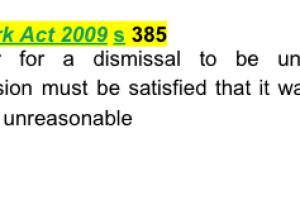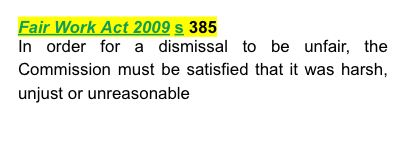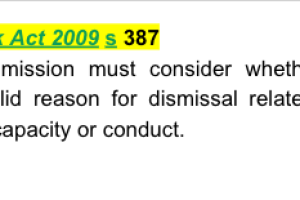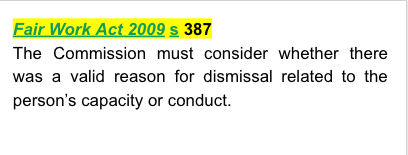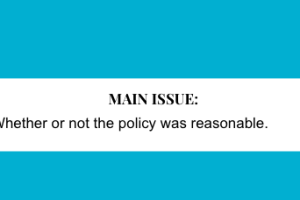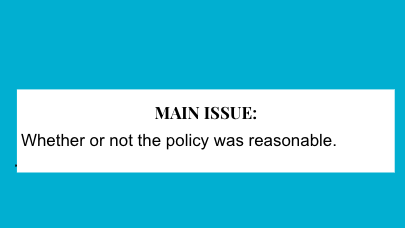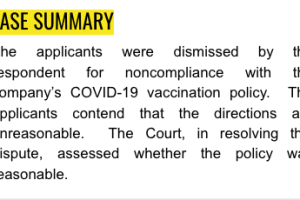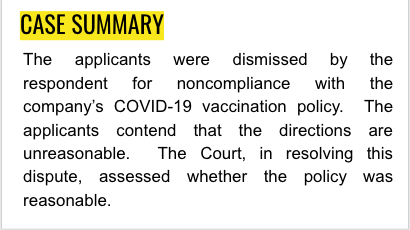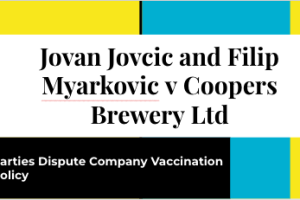Parties Dispute Company Vaccination Policy

Jovan Jovcic and Filip Markovic v Coopers Brewery Limited [2022] FWC 1931 (22 July 2022)

The applicants were dismissed by the respondent for noncompliance with the company’s COVID-19 vaccination policy. The applicants contend that the directions are unreasonable. The Court, in resolving this dispute, assessed whether the policy was reasonable.

Facts:
The applicants were dismissed from their employment with Coopers Brewery Limited (Coopers) on 21 January 2022 on the grounds that they had failed to comply with the company’s COVID-19 vaccination policy (policy), which required employees to be vaccinated against COVID-19 as a condition of entry to the workplace. The applicants submit that Coopers did not have a valid reason to dismiss them because its direction that they comply with the policy was not reasonable.
They contend that the policy did not serve its stated purpose because, contrary to the advice of the Australian Technical Advisory Group on Immunisation (ATAGI), on which Coopers relied in deciding to implement its policy, COVID-19 vaccinations do not prevent the transmission of the virus. In this regard, they rely on the expert evidence of Dr. Nikolai Petrovsky.
The applicants further contend that the direction to comply with the policy was unreasonable because they had objected to becoming vaccinated based on their Serbian Orthodox religious beliefs, and that it was unreasonable of Coopers not to grant them an exemption. The applicants contend that in all the circumstances their dismissals were unfair.
They seek reinstatement. Coopers contends that the applicants failed to follow a lawful and reasonable direction to comply with the policy, which constituted a breach of their contracts of employment and a valid reason for dismissal.
It contends that the requirement to comply with the policy was reasonable because the policy was directed at protecting the workplace health and safety of its employees and reducing threats to business continuity. It submits that the policy was consistent with ATAGI and government advice and was a reasonable measure in response to an unprecedented pandemic. It contends that the applicants’ requests for exemptions from the policy on religious grounds were fairly considered and reasonably refused and that in all of the circumstances the dismissals were not unfair.
Coopers employs over 200 employees around Australia. Most employees, and all production staff, are employed in South Australia. Mr. Jovcic was employed in the role of process operator at the brewery in Regency Park in Adelaide. The role required him to provide operational and technical support to the larger cellar, which is the department where beer is prepared for packaging.
On 7 September 2021, Coopers sent an email to all staff stating that, based on state and federal government guidance, the executive leadership of the company considered that vaccinations were the way out of the pandemic, and that vaccines were one of the best ways to protect oneself and others from the virus, and that Coopers encouraged employees to get vaccinated.
On 6 October 2021, Coopers sent a message to all employees inviting them to participate in a voluntary survey of vaccination status. Eighty-seven percent of respondents stated that they were vaccinated or had a booking for a vaccination. On 9 November 2021, Mr. Shearer and Dr. Tim Cooper, a director of the company, sent an email to all employees in which they stated that, ahead of the opening of the South Australian border on 23 November 2021, the company would be reviewing its protocols to ensure that it was able to respond to COVID-19 transmission within the South Australian community.
A draft risk assessment and vaccination policy were presented to the board on 25 November 2021. The draft policy would require all employees without a medical exemption to be vaccinated as a condition of entry to the workplace. An email was sent to employees to start the consultation process, explaining the board’s view that a high vaccination rate was crucial for ensuring workplace safety, and that the company would welcome feedback on the attached draft policy, which could be provided by various means, either directly to the company or through HSRs. On 7 December 2021, Mr. Shearer met with Mr. Jovcic and Mr. Markovic to discuss the policy.
The applicants raised a concern about the absence of any exemption for religious beliefs. At a meeting on 12 January 2022, Mr. Jovcic told Mr. Shearer that, as a member of the Serbian Orthodox Church, he could not agree to become vaccinated. On 13 January 2022, Mr. Shearer sent the applicants a letter stating that Coopers had not received any confirmation of compliance with the policy by the required time, that their access to the worksite was suspended from 11.59 pm on 13 January 2022, and that Coopers would now consider whether they should be dismissed. Mr. Jovcic did not respond to the letter. Later on 17 January 2022, Mr. Markovic sent an email to the COVID-19 response team requesting the company to reconsider his exemption request.
On 21 January 2022, the company emailed to Mr. Jovcic and Mr. Markovic a letter signed by Dr. Cooper stating that their employment was terminated because they were unable to perform the inherent requirements of their roles and because of their failure to follow a lawful and reasonable direction of the company to comply with its policy.

Issue:
Whether or not the policy was reasonable.

Applicable law:
Fair Work Act 2009 s 387 - provides that the Commission must consider whether there was a valid reason for dismissal related to the person’s capacity or conduct.

Fair Work Act 2009 s 385 - provides that in order for a dismissal to be unfair, the Commission must be satisfied that it was harsh, unjust or unreasonable.

Analysis:
Coopers’ own understanding was that vaccination reduced the risk of transmission of the virus in the workplace. The company believed that it needed to protect these employees by reducing the chance of them contracting COVID-19. In these circumstances, had Coopers decided not to implement the policy, and a vulnerable employee had become seriously unwell or died, Coopers might have been exposed to liability for not taking all reasonably practicable measures to protect that employee’s workplace health and safety from a clearly identified risk.
There would have been questions about causation, and the level of risk that existed at the time. But even if that risk was not necessarily one of high likelihood, the hazard associated with that risk was a grave one. At the time, it was reasonable for Coopers to be concerned that not implementing the policy might be incompatible with its workplace health and safety obligations.
The applicants contended that neither they nor most other workers at Coopers, fell into the categories of persons at particular risk, namely those over 65 and those with underlying health conditions. Still, even if it is rare for persons outside these categories to become seriously ill, especially from the Omicron variant, it remains a real possibility.
Conclusion:
Coopers’ dismissal of the applicants in January 2022 was not harsh, nor was it unjust, or unreasonable. The dismissals were not unfair. The applications are therefore dismissed.

